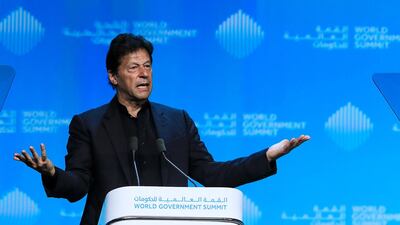During his campaign to become prime minister of Pakistan, Imran Khan often stated his ambition to transform the nation into an Islamic welfare state. In his speech at the World Government Summit in Dubai on Sunday, he spoke instead of wide-ranging economic reforms that will be as painful for the country as they are necessary. Rightly, Mr Khan remains committed to the daunting task of improving the lot of Pakistan's poor. Half of the country's 200-million-strong population lives on or only marginally above the poverty line. One in five people eke out an existence below it. Now, however, Mr Khan has clearly accepted that ending social inequity is a cart that cannot be put before the horse of economic recovery – a reality illustrated graphically by the crisis enveloping Venezuela.
Off-stage in Dubai, Mr Khan met with Christine Lagarde, managing director of the International Monetary Fund, which stands ready to support Pakistan. In a statement afterwards, Ms Lagarde emphasised that IMF aid would be contingent on “decisive policies and a strong package of economic reforms”. Such measures, boiled down in domestic headlines to the single, vote-sapping word “austerity”, are never popular. In the case of Pakistan, however, they are unavoidable. Mr Khan has already embarked on a programme designed to cut the country’s massive fiscal deficit, by eliminating corruption and inept bureaucracy, improving exports, reducing imports, simplifying a complex and failing tax regime and raising the cost of utilities.
In what amounted to a public commitment to the demands of the IMF and a frank pitch to global investors, in Dubai Mr Khan compared his plans to life-saving surgery – painful in the short term, but vital to the health of his country. At several points during his speech, Mr Khan referred to conversations he had had with Sheikh Mohammed bin Rashid, Prime Minister of the UAE and Ruler of Dubai. One piece of advice he had been offered, he said, was simple but fundamental to his country's future: "You must allow businesses to make money."
Pakistan’s potential is enormous, with abundant natural resources, stunning scenery and a rich culture and history. The key to unlocking that potential is the creation of a stable and inviting economic and regulatory environment, in which foreign investors are not only happy, but eager to put their money into the country. Short-term austerity is not incompatible with Mr Khan’s vision of creating a society that protects its poorest and most vulnerable members – it is unfortunately essential. It is in everyone’s interests that Mr Khan succeeds. An economically broken Pakistan benefits nobody. A Pakistani economic miracle could create a valuable trading partner and a beacon of stability and prosperity with beneficial ramifications not only for the region, but the entire world.

